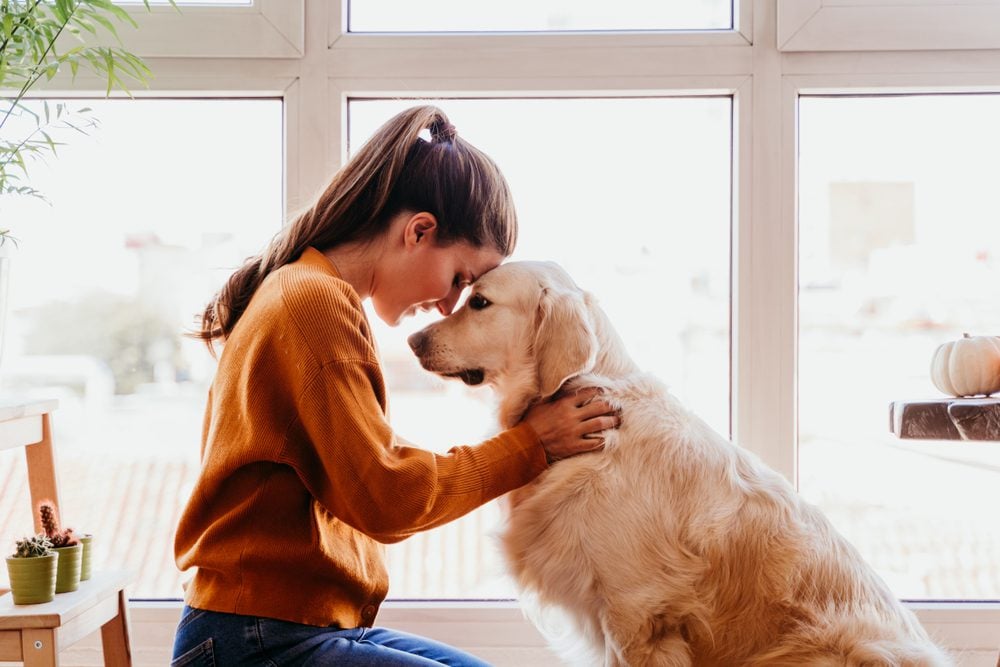Anxiety can be debilitating, holding you back from activities, careers, friendships, or other opportunities. Traditional methods of managing anxiety typically include therapy and medication. While these are great options that can help a lot, they may not be easily accessible to everyone.
Believe it or not, owning a pet can help people cope with and reduce anxiety symptoms. Not all pets will be accessible to everyone, as some pets can be expensive to purchase and care for (like dogs), but just about any pet can have a positive effect on mental health, even fish.
Therefore, those who are interested in having an animal companion can choose one within their means and enjoy the comfort this animal brings them. In this article, we’ll share the five best pets for anxiety and include information about how each pet can help as well as their care requirements.
How Pets Can Help With Anxiety
Anyone who owns a pet will probably have something to say about how that pet is able to help them with their mental health. On top of the multitude of anecdotal evidence from pet owners, scientists have been studying how pets can affect mental health, and the results are promising.
In fact, there are too many studies to list, so instead, we will share some of the most pertinent information gleaned from them in regards to how pets can help with anxiety and mental illness.
Interacting with pets can lower cortisol levels as well as blood pressure. Cortisol is a stress hormone, which means petting an animal can literally reduce stress. Similarly, pet owners were found to have lower resting heart rates and lower blood pressure compared to people who don’t have pets.
Other benefits to having pets include increased activity and a more structured schedule. Exercise in itself is good for reducing anxiety and boosting one’s mental health. Additionally, having a schedule can help people feel like they have more control of their life and are more productive, which can help reduce feelings of stress and anxiety.
Sometimes, pets are the very reason someone is able to get out of bed in the morning, even when they’re feeling their worst. If one is feeling terrible mentally, pets can offer friendship and support unconditionally. This, in turn, reduces feelings of loneliness.
As you can see, pets can be incredibly beneficial to people who struggle with anxiety or other mental health issues. What we’ve discussed here is just the tip of the iceberg.
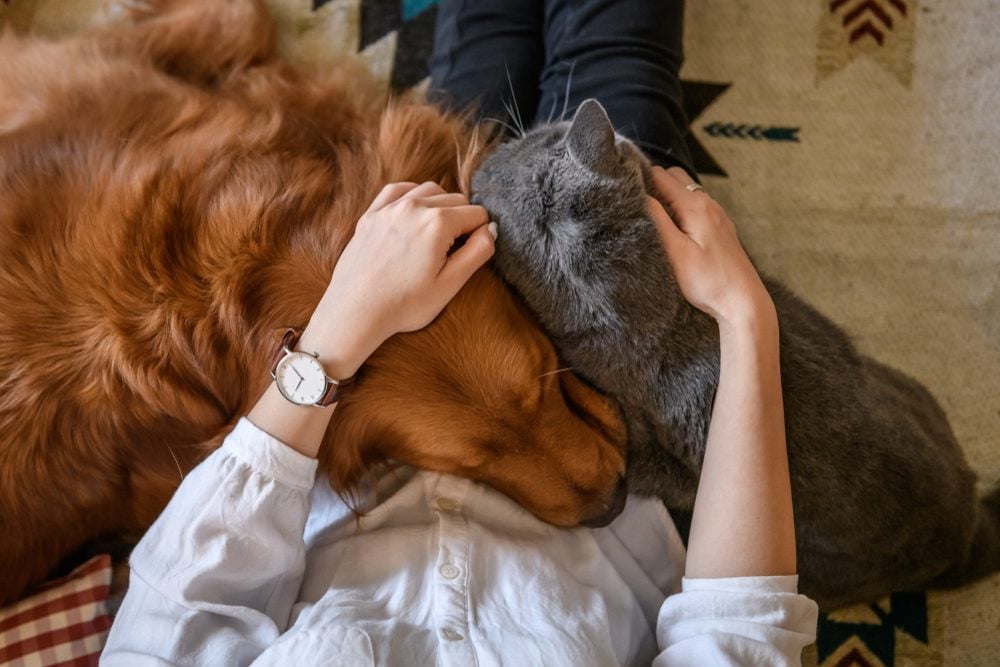


What Is an ESA and Should You Get One?
People struggling with anxiety disorders may be eligible for an emotional support animal (ESA). This is essentially an animal that is prescribed to you by a mental health professional as a treatment for your mental health disorder.
Emotional support animals can be pretty much any type of animal, even a pet that you already own. Though many people are fine with just having pets and never ask their doctor to designate their pet as an ESA, there are some advantages to doing so.
The biggest advantage has to do with housing. Emotional support animals are allowed to live with you, even in apartments or rentals that do not typically allow pets. Landlords may require a letter from your doctor but otherwise have to allow you to live with the animal since it is considered part of the treatment for your mental illness.
For many people in stable living conditions where animals are allowed, designating their pet as an ESA may not be necessary. However, an ESA could be a good option for those who could benefit from a pet but live somewhere where pets aren’t allowed. Furthermore, ESAs are exempt from pet fees in apartments and rentals.
The Best Pets for Anxiety
Now that you understand how pets can help with anxiety as well as the benefits of getting an emotional support animal, it’s time to talk about some of the best pets for anxiety. Remember that owning a pet is also a responsibility and a commitment.
You should be certain that the type of animal you’re interested in suits your lifestyle. We’ll be sure to share information about how to care for each pet so you’ll know what it might be like.
Dogs



It’s probably no surprise that dogs are on this list. They are naturally attentive, loving, and have the capacity to be taught skills that can reduce anxiety further.
As pets, they offer companionship, which in itself can boost one’s mood and reduce negative emotions such as loneliness. They also need to be walked, which means they force their owners to get exercise as well! Exercise has been proven to reduce anxiety. Not only that but petting a dog can lower stress levels in just 10 minutes.
Dogs can also be trained as Psychiatric Service Dogs (PSDs). A PSD is a service dog that performs tasks for their owner to help reduce or manage symptoms of mental health disorders such as anxiety.
For instance, a PSD may lie across their handler’s lap or chest to apply deep pressure therapy. They can also interrupt repetitive behaviors like itching, provide a buffer of space between their handler and others, and offer grounding through actions like kissing, nudging, or pawing at their handler.
Care
Both as pets and service animals, dogs can greatly benefit those suffering from anxiety. However, they may not be the right choice for everyone. Owning a dog is a big responsibility, and dogs tend to cost more than other types of house pets when it comes to food and veterinary bills.
Daily care for a dog requires feeding, watering, and providing mental and physical enrichment. How much exercise a dog needs will vary depending on size and breed, but most dogs will require 30 mins to an hour of moderate exercise per day, with high-energy breeds needing even more.
Training is also an important part of dog ownership. Training is often a daily task when the dog is young or learning. However, even after a dog has been fully trained, dog owners should still hold training sessions at least once per week to help their dog retain their skills.
Luckily, training is a great way to provide mental enrichment and bond with your dog. As wonderful as dogs are, they need a lot of attention, or they can develop negative behavior. Oftentimes, naughtiness is a result of boredom and is a sign your dog isn’t getting enough physical or mental enrichment.
Cats
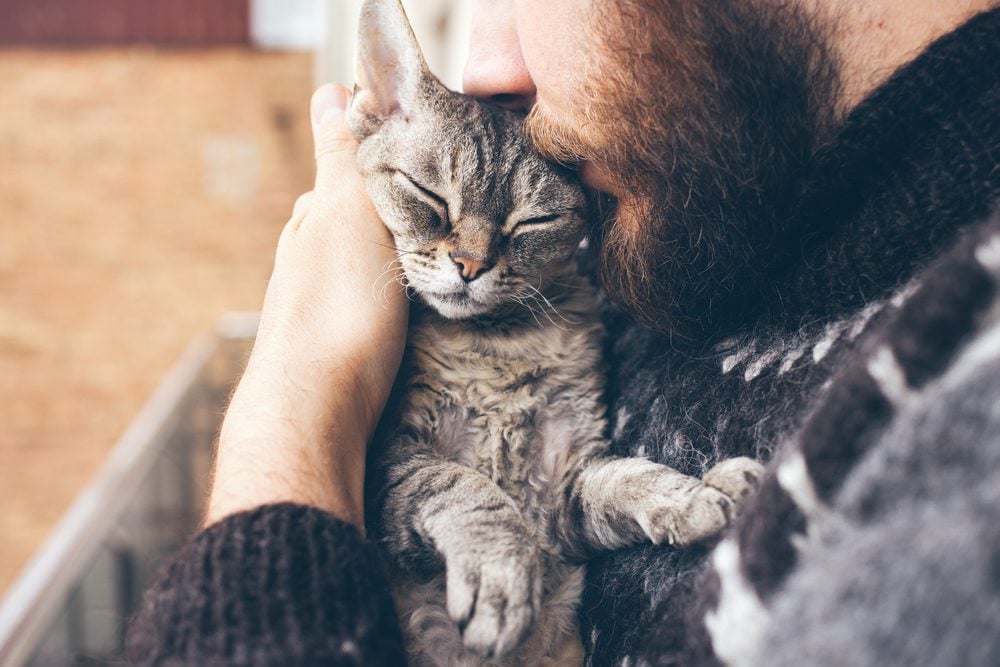


Cats offer many of the same anxiety-reducing benefits as dogs. Not only are they wonderful companions who offer unconditional love, but, like dogs, petting them for 10 minutes can also reduce your stress levels.
Interestingly enough, there is also some evidence that a cat’s purr may have a healing effect. This is because the frequency of a cat’s purr is between 25 and 150Hz. The frequency of this vibration may be able to help people suffering from breathing difficulties, which is a relatively common symptom of anxiety.
Though cats have somewhat of a reputation for being distant or indifferent, this isn’t necessarily the case. Many cats can be loving companions who enjoy cuddling and spending time with their owners. Cats also have unique personalities, just like dogs do. This means their antics can often brighten your day.
Though there is a lot of debate about whether or not cats should be allowed outdoors, some cats do enjoy being hooked up to a leash and going for a walk. Studies show that spending time outdoors is good for your mental health, so there’s no reason you can’t spend time outside with your cat!
Care
Even though cats are easier to take care of than dogs, they still need mental and physical stimulation, especially during their youth. Some people who have never had cats don’t realize that they need to help their cat get exercise, which is often done through play.
Though cats don’t require training as dogs do, they do need to be house-broken. Believe it or not, cats actually can be trained a number of skills using positive reinforcement training like clicker training; training can be a fun activity that provides mental enrichment and reduces boredom.
Cats do tend to be one of the more independent pets, with some owners even feeling comfortable enough to leave their cats home alone for a day or two with the help of feeder bowls and waterers. They’re also great for apartments because they’re quiet. While food and vet bills can still be costly, cats tend to be less expensive to own than dogs.
Fish
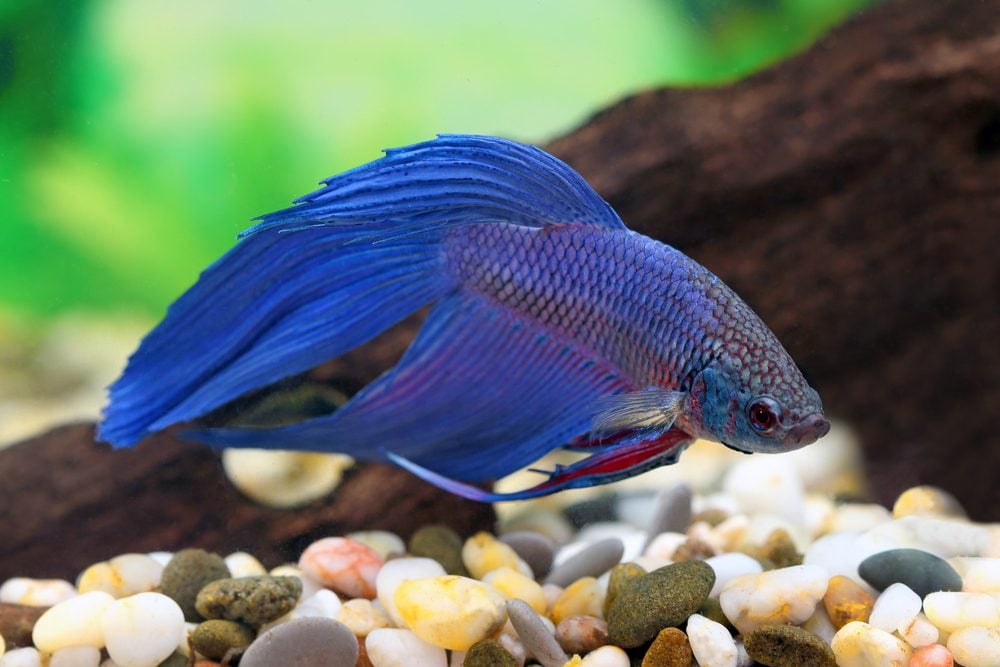


Even though scientific research offers more in-depth explanations, it’s pretty obvious why cats and dogs help with anxiety — they’re affectionate, cuddly animals who allow us to hug and pet them when we’re feeling low. The same cannot be said of fish.
However, owning a fish may actually help alleviate anxiety. A study published in 2019 found that observing fish improved peoples’ moods and helped them feel more relaxed and less anxious. Though you can’t interact with fish directly via petting or hugging, you can enjoy their beauty and add structure to your life through the daily care your fish requires.
Care
In terms of care, fish may be more work than you’d expect. Many people believe they can throw freshwater fish in a bowl, feed them every day, and clean the bowl every so often, and that’s it.
However, fish actually require their tank to be cycled (this refers to the nitrogen cycle) before it is safe to live in. Even fish need a balanced ecosystem.
How much work balancing this ecosystem takes often depends on the size of the tank and the amount of fish. However, you should expect to do partial water changes at least once per week.
Fish can be both cheap or expensive to own. It all depends on the type of fish, the size of the aquarium, and the quality of food you choose to purchase. Some fish, like betta, are relatively inexpensive to keep.
For a single, small fish like a betta, the upfront cost of a tank, filter, heater, and other such materials could cost you around $100. However, aside from occasionally replacing filters, you won’t be spending much money at all to maintain the tank.
Birds
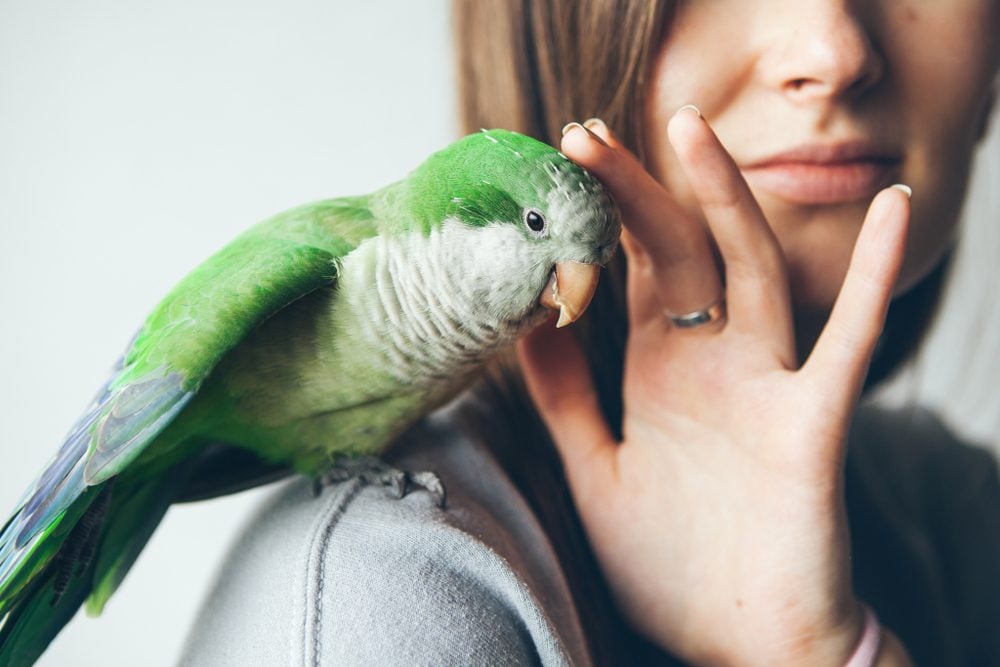


Interestingly enough, you don’t actually have to own a bird to reduce your anxiety. In fact, a study found that people who watched birds out of their windows experienced fewer feelings of anxiety and depression. The more birds they were able to see, the better the results.
However, not everyone lives in an area where wild birds are just outside their window. Owning a bird can also be helpful. While many different species make for great pets and reduce anxiety, we especially recommend parrots.
This is because parrots can “talk.” The way they mimic human speech makes them a lot of fun to interact with, which can help reduce loneliness. Just as with any pet, parrots and other birds provide a sense of companionship.
There are many different types of parrots, with parakeets being an especially popular choice. They are social and enjoy spending time with their owners. If you like the idea of having a bird on your shoulder, then consider getting a parakeet.
Care
As with any animal, birds require care. Though less intensive than caring for a dog, you’ll still need to provide your bird with food, fresh water, and toys.
You’ll need to clean the cage regularly. Taking birds out of their cages for a few hours every day is important, so you’ll need to have a bird-safe space in your home. You should also research the type of bird you’re planning to own.
Parakeets and other types of parrots are companionable to the point where people may even consider them somewhat clingy. If you have to spend long hours away from home, then it’s not unrealistic for a parrot-type bird to suffer due to loneliness and boredom.
You should also be aware that some birds have incredibly long lifespans. Parrot-type birds can live anywhere between 10 and 50 years. Make sure you are ready to care for a bird for the entirety of their lifespan.
Luckily, most birds are not very expensive to own or maintain. The main recurring cost will be that of food, though you may also find yourself spoiling your bird with toys. Because you will need to see a vet who has qualifications to work with exotic pets, the bill for a regular checkup may be pricier.
Rabbits
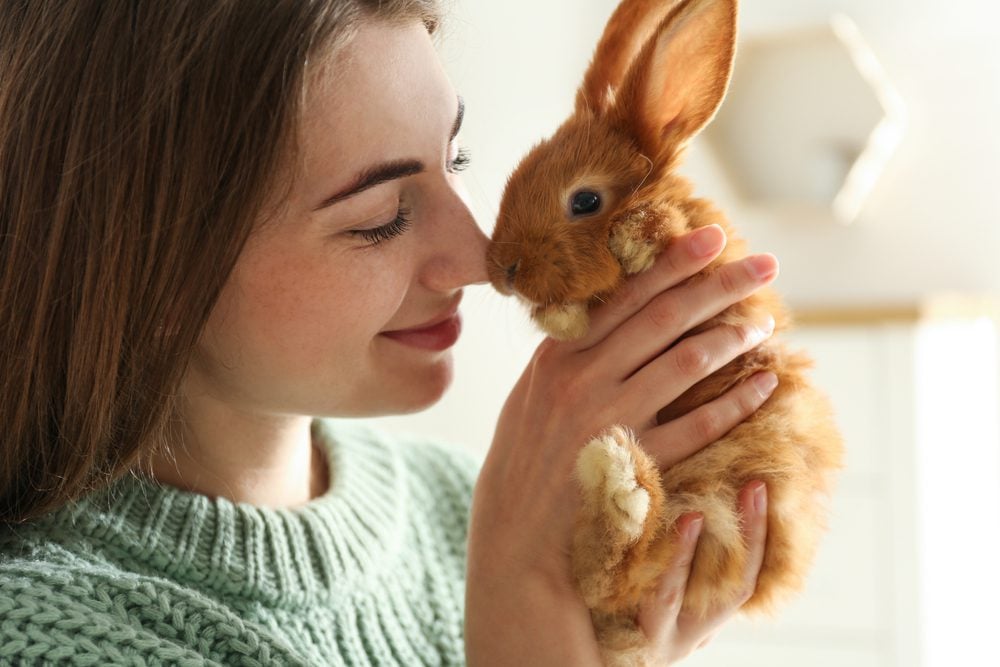


If you’re looking for a soft, cuddly animal, then a rabbit may be a great choice. Much like dogs, rabbits can vary greatly in personality, with some being calm and enjoying lap time and others preferring to play and excelling in clicker training.
Though there aren’t many studies available about rabbits, a few suggest rabbits have a positive effect on reducing anxiety in children and teens. There is also a plethora of anecdotal evidence that rabbits can be soothing to anyone suffering from a mental health disorder.
Usually, people find comfort in simply petting their rabbits and having them in their laps. Though rabbits aren’t heavy enough for deep pressure therapy, their warmth and gentle weight are very pleasant. Rabbits can also be quite playful, enjoying toys and doing things like “binkying.”
As we mentioned, they can be clicker trained. Watching a rabbit play or actively training them can lift one’s mood and even bring joy because they’re so cute and silly.
Care
Rabbits can be kept in cages or in a room of their own – either way, you will need to rabbit-proof a room because they love to chew and could hurt themselves if they come across an electrical cord or some other nefarious item.
Even if you prefer to keep your rabbit caged, they will need to be let out to roam for a few hours every day. Many rabbit owners prefer to use a cage only as a base for feeding and litter training, but keep the door open so the rabbit can roam as they please.
Rabbits are relatively clean animals and can easily be litter trained; for this reason, if their litterbox becomes too dirty, they will do their business elsewhere. Litterboxes should be cleaned often, either daily or every other day depending on how much the rabbit has soiled.
As you can see, rabbits still require a fair bit of care, almost as much as a dog. They aren’t the best choice for those who want a low-maintenance pet. However, rabbits are quiet, don’t require a lot of space, and don’t need to be walked. So they can be a great alternative if you’re unable to own a dog.
Rabbits do need routine veterinary care and aren’t one of the cheapest pets to own. They need to have hay available 24/7, and the bedding in their cage must be replaced weekly. This means recurring costs include food, bedding, litter, and any toys and treats you decide to buy. Just as with birds, rabbits need to be seen by a veterinarian who has credentials in exotic pets or small mammals, which can be more expensive.
Small Mammals



While we previously highlighted rabbits, they may not be best for everyone, so we wanted to give small mammals, in general, an honorable mention. Caring for ferrets, chinchillas, guinea pigs, hamsters, gerbils, and other small pets can also be helpful for people suffering from anxiety.
Any of these pets can provide comfort through interaction and are often a joy to live with and watch. What’s great about small mammals is that they are typically quiet and do not require a lot of space. Some are more expensive to keep than others, but the price of purchasing a small mammal is usually under $100.
You may also have to purchase a cage, bedding or litter, and toys, but all of this normally costs under $500 (and if you look for cages on places like Facebook marketplace, you can save a lot!). Because of their small size and relatively inexpensive upfront costs compared to dogs, small mammals can be an accessible option for many who are looking to bring a fuzzy friend into their lives.
Choosing the Right Pet for Your Anxiety
Owning any type of pet can be beneficial for those suffering from anxiety. Not only can owning pets reduce stress (and even blood pressure), but they can also provide structure and create a sense of responsibility and pride in caring for another living being. The feeling of being needed by a pet can reduce loneliness and increase one’s sense of self-worth.
Of course, not every pet will be the right choice for every person. You should consider how much time you have to dedicate to a pet as well as your budget. Most pets will require veterinary care, but some may be cheaper than others.
Another thing to consider is your living situation. Do you have space for a pet like a dog? What types of pets are allowed where you live? Is it okay if your pet is loud, or do you need a quiet pet? These are all important questions to address.
Though we’ve only included five fantastic choices of pets that can help with anxiety, many other small mammals like ferrets or guinea pigs and even farm animals like miniature horses or alpacas can be beneficial as well. Consider your needs and pick a pet based on that, even if it wasn’t on this list!
